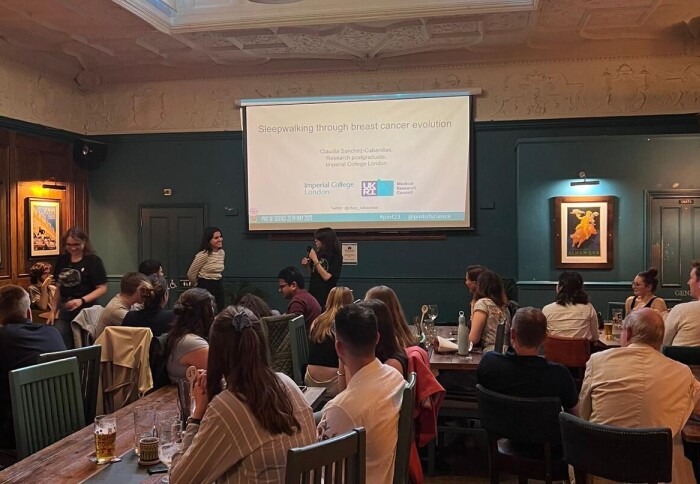Pint of Sciences Festival quenches thirst for knowledge
by Emily Govan

A jam-packed audience joined the Pint of Sciences Festival in May for the opportunity to enjoy a array of fun and captivating science.
Sponsored by the Department of Life Sciences, the event included exciting talks around Biting Back at Malaria, The Secrets of Sleep and Cell Wars – Understanding the battle against Cancer. There was something for everyone.
Pint of Science is an annual worldwide science festival which brings researchers to local pubs and cafes to share their scientific discoveries with audiences - no prior knowledge is required. The festival happens over three evenings in May simultaneously in multiple cities around the globe. For attendees it’s an opportunity to hear about learn about science and directly question those who are responsible for research. And for scientists it’s a platform to share their research and provide a different perspective.
Attendees flocked to this year’s event at Imperial and included friends of current students, current and retired academics from other universities – and lots of curious members of the public!
The theme of the first night was Biting back at Malaria and there were three talks from Life Sciences researchers who specialise in infectious diseases. Dr Nora Schmit and Gina Cuomo-Dannenburg talked about the tireless work to unravel the secrets of malaria and the development of new tools to combat it. Dr Patrick Walker discussed cutting-edge methods used to track the spread of malaria, estimate its impact, and understand which interventions work. And Dr Stefan Ebmeier rounded things off with discussion of the reasons why some people recover from malaria quicker than others and how this may inform drug development. These themes explored the microscopic world of malaria parasites and the tools we have to fight this illness. The audience also discovered the power of mathematical modelling to track the spread of malaria and developed strategies for its control.
"Exploring the mystery of our body is always an enjoyable and fascinating experience for me as a biology student. Joining Pint of Science allows me to see how researchers have done intensive work to improve our understanding of humans from various fields". Rebecca Lin Life Sciences undergraduate
The second night consisted of two talks about the theories and pathways behind sleep and how the brain functions. Dr Alice French explored the evolution of neural circuits and Professor Jason Rihel from UCL investigated the mysteries of sleep and arousal (feeling of excitement or alertness) in zebrafish. Through his work, he demonstrated that fish have sleep-like states governed by similar genes and neurons to those that regulate sleep in humans.
The third night wrapped things up with three talks about battling cancer including how cancer arises, how new drugs are discovered from designing different chemicals, current treatments targeting collagen, and epigenetic research on cancer dormancy cutting-edge technologies. The talks were given by PhD students Kyle Greenland and Claudia Sanchez Cabanillas, and Research Postgraduate Charlie Brown. They introduced the audience to the processes that lead to cancer and explored an innovative approach to using nanoparticles for cancer therapy. The talks also introduced the role of epigenetics (how an individual's behaviours and environment affect how their genes work) in the evolution of breast cancer cells.
The audience immensely enjoyed appreciated learning about the exciting research Imperial is doing, from passionate researchers in an informal setting - and having the opportunity to ask lots of questions.
Rebecca Lin, Life Sciences undergraduate and organiser, said: ‘Exploring the mystery of our body is always an enjoyable and fascinating experience for me as a biology student. Joining Pint of Science really allows me to see how researchers have done intensive work to improve our understanding of humans from various fields and show the complexity of human beings. Also, this provides a great opportunity for more people to communicate and engage with professionals and gain a more in-depth understanding of ourselves’.
Article text (excluding photos or graphics) © Imperial College London.
Photos and graphics subject to third party copyright used with permission or © Imperial College London.
Reporter
Emily Govan
Department of Life Sciences